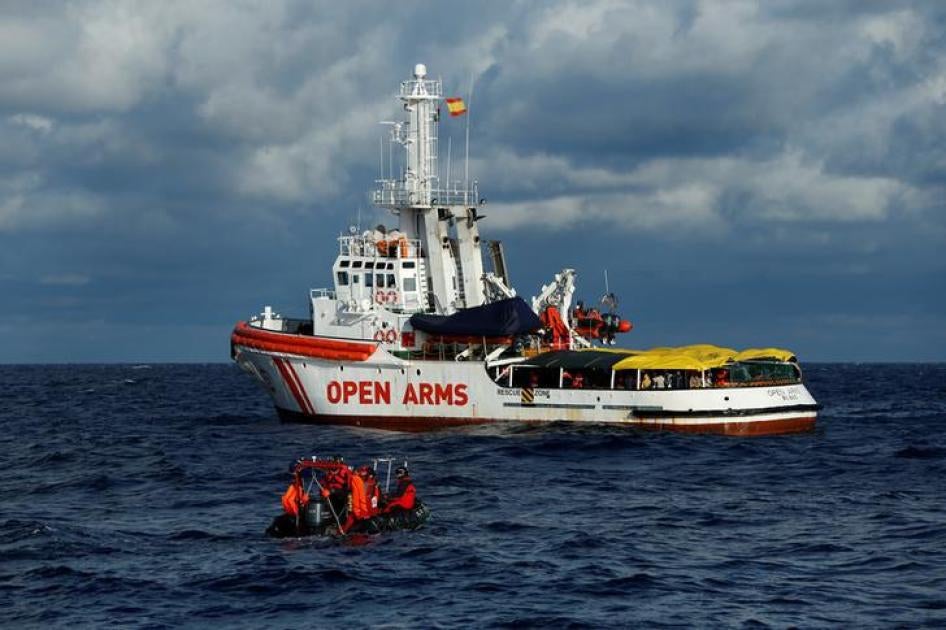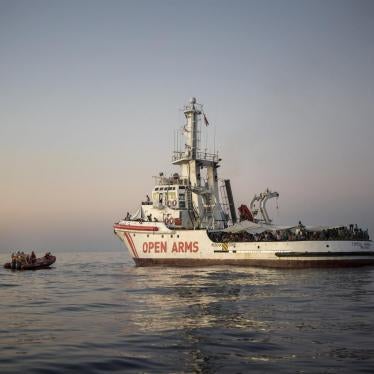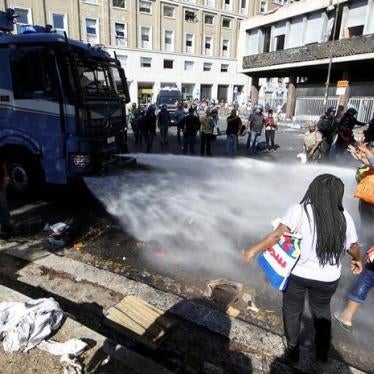WE MAY NEED to curb our enthusiasm over an Italian judge’s April 16 decision to release the rescue ship Open Arms, operated by the Spanish group Proactiva, which Italy impounded a month ago.
Although the Open Arms may soon sail again and perform vital rescues in the Mediterranean, two crew members face unjustified criminal charges. But Italy’s determination to enable Libyan coast guard forces to intercept migrant boats in international waters is cause for the deepest concern.
The case against the Proactiva rescuers hinges on their refusal, on March 15, to hand over people they had rescued to a Libyan coast guard unit in international waters despite instructions from the Italian maritime rescue coordination center that Libya had taken over responsibility for the operation.
A prosecutor in the Sicilian city of Catania opened an investigation and ordered the Open Arms impounded. A preliminary investigations judge in Catania dismissed the initial charge of criminal association but upheld the charge of facilitating irregular migration and the impounding of the Open Arms. The case was transferred within Sicily to Ragusa, where a preliminary investigations judge released the ship.
On his way to concluding that there is insufficient evidence of wrongdoing to justify continuing to sequester the ship, the Ragusa judge presented some positive but also potentially dangerous – and somewhat contradictory – arguments.
The judge made the important point that the abuses migrants face in Libya justified Proactiva’s refusal to hand people over to Libyan forces. He cited a “state of necessity” provision in Italian law that absolves someone of a criminal act if it was necessary “to save others from a real threat of serious harm.” The judge rightly noted that under international maritime law, a rescue operation only ends when the people rescued disembark at a safe place and that nowhere in Libya can be considered such a place.
This is critical, as it goes to the larger issue of the legitimacy of E.U. and Italian cooperation with Libyan coast guard forces. There is overwhelming evidence of abuse in Libyan migrant detention centers in all parts of the country, including those under nominal control of the Government of National Accord (GNA). The abuse includes torture and other ill treatment, rape, extortion and forced labor, as well as deprivation of food, water and healthcare, and unsanitary conditions.
Yet Italy is increasingly providing logistical support to enable Libyan coast guards to intercept boats in international waters, even when there are properly equipped vessels operated by nongovernmental groups or others on or closer to the scene. The evidence considered in the Proactiva case clearly illustrates that the Italian rescue center, which received the first distress alert, is determined to hand over responsibility to Libyan authorities. And it shows the active role of Italian navy personnel on board the Capri, an Italian warship docked in Tripoli at the time, in coordinating the movements of Libyan patrol boats.
The same judge upheld the legal fiction of a Libyan search-and-rescue region that the Italian government supports. The Government of National Accord declared such a region in August 2017, but the International Maritime Organization has yet to include that region in its Global Search-and-Rescue plan. No amount of wishful thinking can hide the fact that Libyan coast guard forces lack the equipment, capacity and professionalism to perform these duties. In fact, Libyan patrol boats have on numerous occasions engaged in reckless and abusive behavior against migrants and members of rescue organizations during sea operations.
Libyan coast guard units have a right to operate in their own territorial waters. But legitimizing intervention in international waters by coast guard units only nominally controlled by the Government of National Accord contributes to increasing insecurity and chaos on the high seas, further endangering lives. The Italian rescue center recently instructed the rescue group SOS MEDITERRANEE to refrain from assisting over 100 people crowded onto a rubber boat because Libyan coast guard forces were taking over coordination of the operation.
The group was forced to negotiate with Libyan forces to be allowed to stabilize the situation and evacuate families with children and urgent medical cases to their ship in what SOSMEDITERRANEE described as a “tense and dangerous emergency situation.” The Libyan patrol boat intercepted all the other people on the rubber boat in a move that cannot properly be called a rescue.
Affirming a Libyan search-and-rescue region means accepting that the people Libyan forces take onto its patrol boats will be disembarked in Libya, which we know will lead to detention and abuse. The U.N. refugee agency, UNHCR and the International Organization for Migration are not always there when the people disembark, nor do these agencies have regular access to Libyan detention centers.
Efforts to reform Libya’s detention regime and the treatment of migrants and refugees will be relevant when the situation for migrants and refugees in Libya actually improves. But the possibility of reforms cannot justify policies that place people in harm’s way today. Working with the Libyan coast guard to enable them to intercept people in these circumstances may be tantamount to aiding or assisting the commission of serious human rights violations.
Proactiva is being prosecuted for refusing to return people to a cycle of detention and violence in Libya. Instead, it is Italy and the E.U. that face moral and quite possibly legal sanctions for helping Libyan coast guard forces intercept people in international waters and take them back to cruel, inhuman and degrading treatment.










